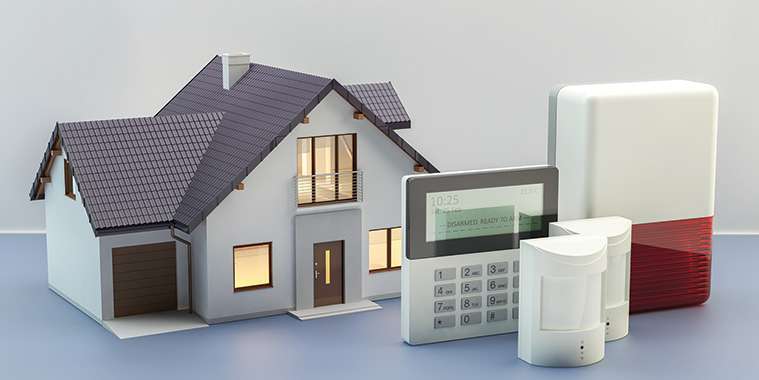You really love your large, flat-screen TV and all your awesome gadgets, right? Well so does someone else.
It’s a scary thought that there could be someone casing your joint right now from across the street. But that doesn’t mean you’re defenseless — there are plenty of ways to make your home more secure.
But what kind of security system do you need, and where should you start? We know the dozens of options and ever-evolving technology can be overwhelming, so we’re here to walk you through the basics. Let’s take a look.
Can the system grow?
“It all starts with the main control panel,” says Merlin Guilbeau, executive director and CEO of the Electronic Security Association, a nonprofit trade association for security systems.
And the most important thing is to make sure that the main control panel, or hub, is expandable. That’s because you may want to add remote-controlled locking or an extra camera out back to your system sometime down the road. So make sure to choose a company that offers that kind of flexibility.
How is it installed?
Some companies require the hub — even one they tout as “wireless” — to be installed (by drilling) in the wall. This may not be ideal for your situation (what if you decide to swap services or cancel? What if you’re a renter?). Other companies provide a central system that’s less invasive, or offer an out-of-the-box DIY system.
What’s your lifestyle like?
When talking with a security automation provider, you should start by explaining your habits and the peaks, valleys,and quirks of your schedule — really, all the personal details that will help create a security system personalized for you.
“Do you have a kid who comes at a certain time while you’re at work?” Guilbeau says. “Do you have pets? Is there an elderly person in your home? Really make them understand all about your lifestyle.”
For example, if you have a senior living with you, it might be a good idea to install Wi-Fi–connected cameras throughout your house in order to monitor your loved one while you’re away.
Do you have the right camera?
Speaking of cameras, you don’t want one that will send you a grainy picture that only the CSI crew could decipher. But there’s more than resolution to consider.
• Can it be accessed remotely (like through an app)?
• Is it Wi-Fi–enabled?
• Can it send recorded information to a cloud service of some kind (or your email)?
• If it’s an outdoor camera, is it weatherproof?
• Is it installed in such a way that a thief can’t reach up and snip the wire?
• Does it have night vision capability?
Are the motion detectors up to snuff?
If you’re going this route, make sure the alarm rep knows if you have kids or pets. Motion detectors operate on an infrared frequency and are triggered by size — small pets may not be a problem, but kids will probably trip the system.
Modern motion detectors are often non-invasive (they won’t be drilled into your wall), easy to move, and expandable.
Can you control the lights and locks?
Being able to turn on the lights when you’re away gives your home that “somebody’s home” look that deters potential burglars. Remote-controlled locks allow visitors in while you’re gone, and you never have to worry whether you remembered the house key on the way out the door (although you’ll want to remember your smartphone).
Monitored vs. self-controlled
Monitored systems: You know these — they’re the kind of alarm systems that are remotely connected to call centers staffed with trained pros who call you to make sure everything’s OK when the alarm goes off. If they can’t reach you, they call the police or other emergency services (for example, a fire alarm that detects heat and smoke could directly alert the fire department).
Self-controlled systems: These are controlled by you and only by you. You get an app notification when something’s gone awry, and you decide whether to call for an emergency.
Does the alarm company send Dog the Bounty Hunter?
It’s somewhat rare, Guilbeau says, but some alarm companies send their own team first before calling the authorities. But unless they have some kind of personal helicopter-bound SWAT team, you want a company that sends the police — or at least gives you that option.
“Police response is the best form of response,” Guilbeau says.
How loud is it?
This is a fine balance to strike. If the system is too quiet, then your neighbours won’t hear it and it won’t freak out criminals. But if you can hear it clear down the block, you might wind up with really angry neighbours — and ultimately be looking at a noise pollution fine. (Yes, we’ve really seen that happen!)
How many extras do you want?
After you find an expandable hub and get the basics down, “then you can have fun,” Guilbeau says.
It’s not all about security. A remote-controlled thermostat saves you time and money, and can start warming up your home during a bitter winter commute from work.
A camera at your front door can not only alert you whenever someone is ringing your doorbell (or stealing a package off your stoop), it can also upload the recorded image or video to cloud storage.
You could even use the system to get an image of your kid arriving at home from school — all while you’re sitting at the office.
Costs and terms
Finally, when you do choose a company, be sure to go over all the paperwork. Installing an alarm system can cost anywhere from $100 to more than $1,500, depending on your location and the features you’re looking for — though the average reported cost for such a job is $670.
A few things to keep in mind, according to Guilbeau:
Get an itemized list of costs for all the different equipment that will be installed.
How much is the system on a monthly basis?
Is there a discount if I pay it annually or quarterly?
What happens when the contract renews?
Pro tip: Self-controlled systems are cheaper than monitored ones, so you may be able to afford additional tools without the overhead cost of monitoring.
You might think home security systems are a splurge, but they can get you a decent discount on your homeowner insurance. And that’s a lot more than just peace of mind.
— realtor.com



